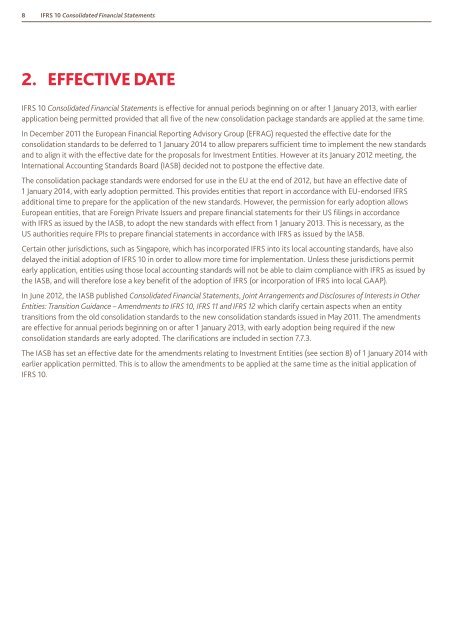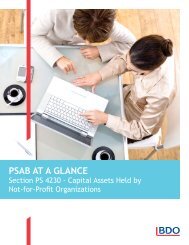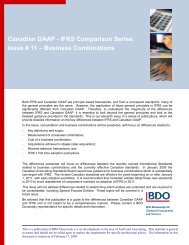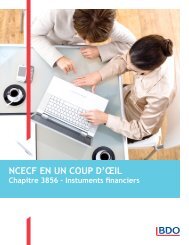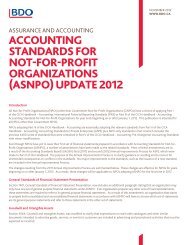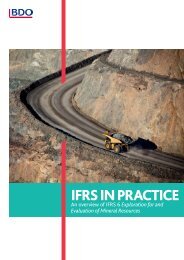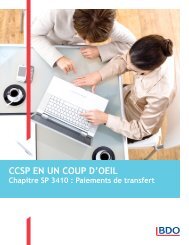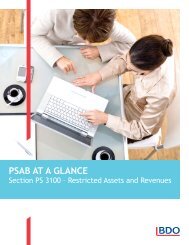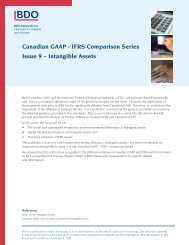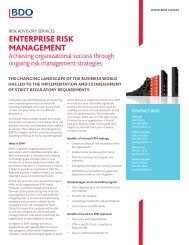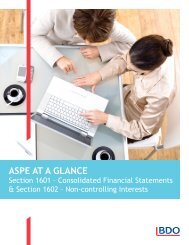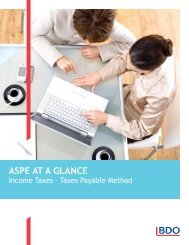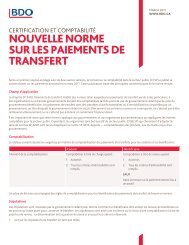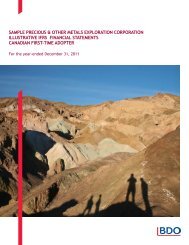Need to Know: IFRS 10 - Consolidated Financial ... - BDO Canada
Need to Know: IFRS 10 - Consolidated Financial ... - BDO Canada
Need to Know: IFRS 10 - Consolidated Financial ... - BDO Canada
- No tags were found...
Create successful ePaper yourself
Turn your PDF publications into a flip-book with our unique Google optimized e-Paper software.
8 <strong>IFRS</strong> <strong>10</strong> <strong>Consolidated</strong> <strong>Financial</strong> Statements2. Effective date<strong>IFRS</strong> <strong>10</strong> <strong>Consolidated</strong> <strong>Financial</strong> Statements is effective for annual periods beginning on or after 1 January 2013, with earlierapplication being permitted provided that all five of the new consolidation package standards are applied at the same time.In December 2011 the European <strong>Financial</strong> Reporting Advisory Group (EFRAG) requested the effective date for theconsolidation standards <strong>to</strong> be deferred <strong>to</strong> 1 January 2014 <strong>to</strong> allow preparers sufficient time <strong>to</strong> implement the new standardsand <strong>to</strong> align it with the effective date for the proposals for Investment Entities. However at its January 2012 meeting, theInternational Accounting Standards Board (IASB) decided not <strong>to</strong> postpone the effective date.The consolidation package standards were endorsed for use in the EU at the end of 2012, but have an effective date of1 January 2014, with early adoption permitted. This provides entities that report in accordance with EU-endorsed <strong>IFRS</strong>additional time <strong>to</strong> prepare for the application of the new standards. However, the permission for early adoption allowsEuropean entities, that are Foreign Private Issuers and prepare financial statements for their US filings in accordancewith <strong>IFRS</strong> as issued by the IASB, <strong>to</strong> adopt the new standards with effect from 1 January 2013. This is necessary, as theUS authorities require FPIs <strong>to</strong> prepare financial statements in accordance with <strong>IFRS</strong> as issued by the IASB.Certain other jurisdictions, such as Singapore, which has incorporated <strong>IFRS</strong> in<strong>to</strong> its local accounting standards, have alsodelayed the initial adoption of <strong>IFRS</strong> <strong>10</strong> in order <strong>to</strong> allow more time for implementation. Unless these jurisdictions permitearly application, entities using those local accounting standards will not be able <strong>to</strong> claim compliance with <strong>IFRS</strong> as issued bythe IASB, and will therefore lose a key benefit of the adoption of <strong>IFRS</strong> (or incorporation of <strong>IFRS</strong> in<strong>to</strong> local GAAP).In June 2012, the IASB published <strong>Consolidated</strong> <strong>Financial</strong> Statements, Joint Arrangements and Disclosures of Interests in OtherEntities: Transition Guidance – Amendments <strong>to</strong> <strong>IFRS</strong> <strong>10</strong>, <strong>IFRS</strong> 11 and <strong>IFRS</strong> 12 which clarify certain aspects when an entitytransitions from the old consolidation standards <strong>to</strong> the new consolidation standards issued in May 2011. The amendmentsare effective for annual periods beginning on or after 1 January 2013, with early adoption being required if the newconsolidation standards are early adopted. The clarifications are included in section 7.7.3.The IASB has set an effective date for the amendments relating <strong>to</strong> Investment Entities (see section 8) of 1 January 2014 withearlier application permitted. This is <strong>to</strong> allow the amendments <strong>to</strong> be applied at the same time as the initial application of<strong>IFRS</strong> <strong>10</strong>.


